

What is it really? Each person has his / her own. What is true in the stories we tell about our lives and feelings? This excellent film tells us about that in an astonishingly good way. The several intervenients whose lives intersect with each other, very intensely in some cases (most of them belong to the same family) are telling us their versions of what they know (or think they know) about a woman already dead and who is the mother of some of them. And they do it in a very natural and spontaneous way. Who and what was her after all? This movie has much to do with human nature and human relations mainly in the family and conjugal fields. Why reading fiction books if in our normal lives it may happen such interesting and important situations as the ones told in the best novels? A movie that must be indeed be seen.
... View MoreI never review movies but hated this so much and didn't find nearly enough vitriol on here.I didn't go into this wanting to dislike it and withheld judgment until the final act. And before I get ripping, I did find the second husband, the polley one, to be likable if completely uninteresting. As other reviewers have stated, this is not an examination of or even a rumination on narrative or recollection or truth or family. The film attempts to explain to us how deep it is in the last act, seeking to justify itself and help us process the deep currents that arnt there. That stuff is clearly tacked on and then overtly hammered home in a specious, ', if we have have the genial gravitas of a liberal arts class or Ira Glass, maybe people will swallow it' way to compensate for the total flimsiness and worthlessness of the film both formally and in terms of character/narrative/thought/substance.I'm shocked that a movie that has to literally state its thesis at least three times toward the end in an attempt to justify its existence, and hopes to pass that off as either clever or deep and 'meta', hasn't been more widely ridiculed,Furthermore, Sarah P is generally unlike able (we hear her voice, and see her in the process of making the film and are imp'icitly supposed to identify with her and root for her without ever being given reason to -and I am a cinephile because I am eager to empathize with the voices and faces on the screen). The mom character, who is sketched broadly and reductively (with the same simple take of her repeated over and over but apparently she was not interesting enough for anyone to have a engaging anecdote), seemed intolerable.And the biological father (Harry?) is one of the grossest people I have ever seen in a documentary. Totally delusional narcissistic clown, totally Embarrassing to watch. Incredible shocking disgusting hate-able narcissism that is emblematic of the worst of the wannabe baby boom generation, just as Sarah P seems to hold down the vapid navel gazing narcissism for gen x or whatever she is. Can more people flay this garbage pleease? Check out Close Up or My Winnipeg for films dealing with the complexity of narrative and origin that actually carry intellectual and artistic weight
... View MoreI've been a fan of Sarah Polley since "The Sweet Hereafter," and Michael P is memorable as one of the music-hall cutups in "Slings and Arrows" (which is on our shortlist of best TV series ever, btw). I guess it's interesting that even Canadian showfolk sometimes got up to mischief in the 70s; Sarah's no Errol Morris, but she does a pretty good job of rounding up the surviving members of her extended family (most of them quite charming) and "interrogating" them about what went on in those days. A fair number of online commenters have objected to the sly way that a few staged scenes, cleverly processed to look like vintage Super 8, are included in the film, but that only seems to underscore the point that the past can only be recovered through memory and the imagination. (It's pretty clear which scenes are staged and which are real home movies, I think.) I agree that the critics may have oversold this one, and it does go on a bit too long after the big reveal, but basically I'd recommend it.
... View MoreSarah Polly's intimate and unique documentary Stories We Tell was one of last year's biggest festival and critical hits in the doco field with her fresh approach to telling a story using 8mm film to recreate the past and talking heads to tell the present hitting a chord with audiences. As one of the most critically acclaimed movies of last year hype for the movie remains strong and in that respect Stories We Tell is an overrated movie.To get the most out of Stories one must be wholly invested in the concerns of Polly's family and the eventual revelations that come forth from her questioning and investigating of the past but if your investment is minimal as I found mine was any emotional impact the film clearly has for many is dulled and therefore the film as a whole nothing more than a slightly intriguing piece of life in all its glories and in all its hidden secrets. It must be said however that the films early stages are quite promising and downright riveting it's not until revelations are made clear that the film starts to struggle and you get the sense this is more a film for Polly herself than we the watchers.It's nice that Polly chooses to air some very personnel and deep seeded emotions in the way of this film but one question's if what is being found out is of much benefit for someone not in the Polly family. Great documentaries like Searching for Sugarman or Dear Zachary work on emotional levels because what is being discovered as the film and participants go on is relatable in more large scale and universal ways, Stories showpiece just does not have the power to affect like this. The film also has a waft of self-importance that allows proceedings to sadly go in circles and length wise drag out to near two hours which with this format gets old fast.Being critical as I have been, Stories is still a movie that will appeal to many a wide ranging audience and for people that may have been through similar family circumstances a tale that will really hit home. For the rest of us though Stories sadly is one of last year's more overrated documentaries and in a genre that is consistently producing the goods it will be quickly forgotten in the wave of other quality entries.3 storytellers out of 5 For more movie reviews and opinions check out -www.jordanandeddie.wordpress.com
... View More